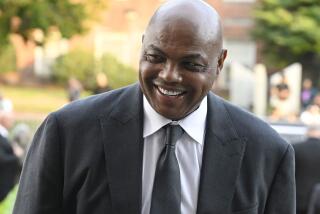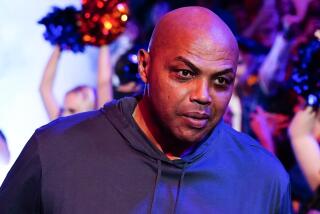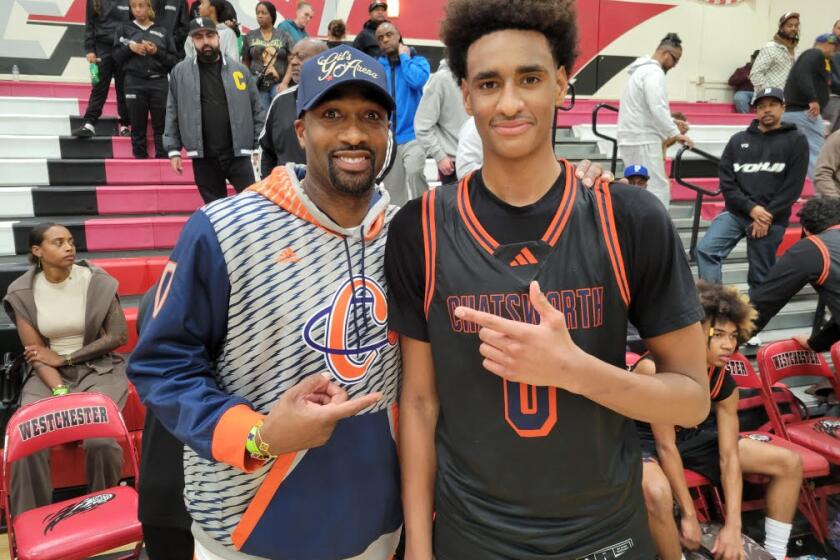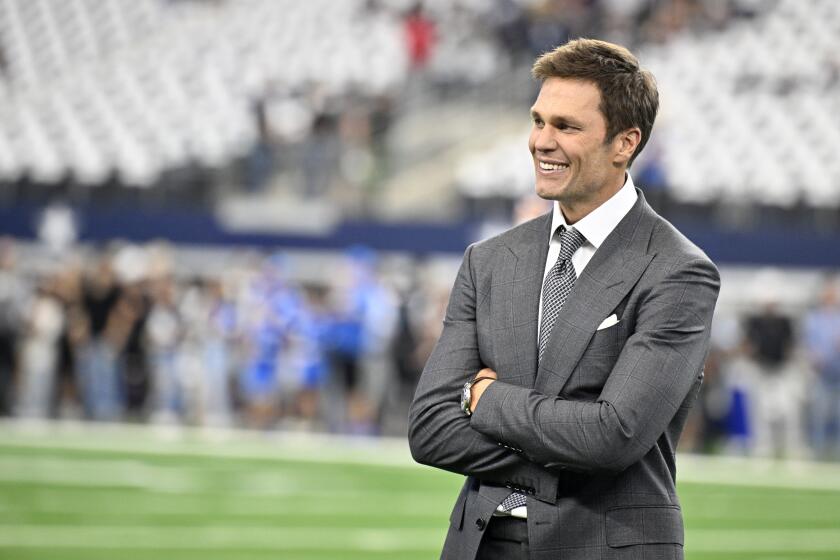He shoots from the lip and scores
ATLANTA — At 10 minutes to 6, Ernie Johnson walks on to the “Inside the NBA” set in Studio J, a Turner Network Television facility. The set’s focal point is a desk, where Johnson sits, with empty chairs on either side.
The set is a dizzying, dazzling array of red and blue light. It includes a little living room, a full-height, half-court basketball playing area, enough pennants to outfit a Mardi Gras parade, and a mock night-time high-rise skyline. The set is gaudy and somewhat ridiculous for a venue where what mainly happens is three guys sit around and talk, mostly -- but by no means exclusively -- about basketball.
At five minutes before 6, however, Johnson has no one to talk to. He’s alone at the desk.
At three minutes before, he’s still alone.
At two minutes, alone.
At 90 seconds to air, Kenny “The Jet” Smith saunters on set and takes the chair immediately to Johnson’s left. He’s followed by Charles Barkley, conducting a loud and profane discussion with one of the show’s staff.
As soon as he sits down, he starts loudly recounting another argument, this one with producer Tim Kiely, who, Barkley says, is censoring free speech and threatening the future of civilization by prohibiting Barkley from using a slang word for feces on the air.
“I’m bitter and angry tonight,” Barkley announces almost exactly at the moment Johnson looks up and, in the steady, comforting tones of the professional broadcaster, welcomes several million fans around the world to another edition of “Inside the NBA.”
The show, which originates in Los Angeles tonight for the Western Conference finals, is without much contest the world’s best show about basketball.
With the NBA playoffs in full flower, we’re reminded again that the most entertaining figure in professional basketball, maybe in all of sport, is not Kobe or LeBron or any other mere player. It is Barkley, just one-third, or sometimes one-fourth, of a talking-head panel -- most of it bald -- that introduces and analyzes the games.
In addition to these duties, Barkley, 45, is a declared 2014 candidate for governor of Alabama; a member of the basketball Hall of Fame; co-star of a mobile telephone advertising campaign wherein he, nearly a decade past his playing days, and not the current NBA star who shares billing with him, is clearly the main attraction; a compulsive gambler (on Tuesday he paid off a $400,000 debt to a Vegas casino); an erstwhile hero of the political right, from within which one blogger hailed him as a philosopher, poet, genius and the next president of the United States; inspiration for the chart-topping group Gnarls Barkley; and gracious butt of a thousand jokes.
Barkley, above all else, is someone who will say whatever occurs to him when it occurs to him, whether or not he’s on the air.
To wit:
Talking during a game recently about a free throw missed at a crucial time by a high-percentage free-throw shooter, he said: “That 90% doesn’t mean nothing when you have a tight sphincter.”
Talking about a bad team: “The Nets are like the Democrats . . . they don’t win even though the rest of the division sucks.”
Talking about whether New York Knicks Coach Isiah Thomas’ job is safe: “He’s about as safe as me in a room full of cookies. If I’m in a room full of cookies, the cookies ain’t got no damn chance.”
Ernie Johnson recalls that the first time Barkley appeared on the show, in 2000, Barkley asked Smith during a break what he was going to talk about during the next segment. Johnson recalled, “Kenny said, ‘You’ll find out.’ ”
This was perfect, said Kiely the producer. Kiely’s notion was to have a show that was spontaneous, dynamic, like an overheard conversation. His ideal was closer to the PBS political shout-fest “The McLaughlin Group” than to conventional television sports post- and pregame analysis.
Barkley was more than accommodating. That first year, he accused the league of giving TNT all the bad games: “NBC gets all the good games. We get the Little Sisters of the Poor.” He said he could beat the Detroit Pistons with a team of studio technicians. He said All-Star Grant Hill’s ears were too big. He delivered these comments and many, many more in a voice that ranged between a bray and a sonic boom.
His weight became a recurring subject of conversation. By NBA standards, he is not tall; he’s slightly more than 6 feet 4 inches, yet he carries more than 300 pounds, much of it in a backside that his wife, Maureen, once said was “the size of New Jersey.”
To simply call Barkley fat, however, is to disregard the physical power at his command. As a player, he was the shortest man ever to lead the league in rebounding, a skill derived more from desire and ferocity than height.
“If you want to be a rebounder you have to approach it like, ‘Let’s just beat the hell out of each other all night.’ It’s all you’ve got,” Barkley said.
Barkley’s ferocity notwithstanding, the show treated him like a pinata. A computer graphics guy routinely placed Barkley’s big, round, shaven head on top of ridiculously mismatched bodies, which the show’s director then played on air almost endlessly.
A weekly feature the first year was Barkley getting on a scale to see how much weight he had -- or had not -- lost. He took it all with good grace and laughter.
Kenny Smith said when he began on the show in 1998 he imagined it was something he would do for a year, maybe two.
“The second year started being something different. Charles took it and exploded it. It just escalated,” he said. “Between Charles and I, there’s nothing that’s going to happen in a basketball game that we haven’t seen or experienced. Once we started to trust one another, there was no looking back. We’ve become part of the game.”
Players watch the show carefully. In interviews at halftimes of games, they complain about something said on “Inside” before the game started. You tell Charles and Kenny, they’ll say. Or, What Charles said ain’t right.
At the same time, the “Inside” cast has become guidance counselors, favored uncles, givers of grown-up advice. Their cellphones receive endless streams of text messages and calls from players around the league seeking advice, critiquing their critiques, angling for guest spots at the desk, complaining about playing time.
Johnson prepares for each show by studying clips and statistics and reading for five or six hours. He arrives at the studio by noon most days, a time at which Barkley is apt to be asleep. “I get up late. I’m in no hurry to get out of bed. I like having free time to do nothing,” he says.
After Johnson’s opening, Smith and Barkley and sometimes a fourth person, almost always a player or one not long retired, add a minute or two of commentary, then the game starts and they retreat to a viewing room equipped with a 20-foot tall wall of television monitors.
They go back on set to talk for a few minutes at halftime. On this night they get in an argument about proper punishment for players who aren’t in the game but rush to the assistance of other players involved in confrontations on the floor.
As often happens, Johnson and Smith have one opinion, Barkley another. The argument outlasts the halftime; they go off-air, the game resumes, but the three of them stay there on the set arguing.
They retreat again to the viewing room until the game is over, when they come back out for the meat of the show, 30 minutes of commentary, highlights and often some bit the crew has cooked up to make one or more of them look foolish.
While watching in the viewing room, Barkley spends a lot of time critiquing everything in sight -- the game, the referees, the coaches, the food, the staff, Smith.
On this night they’re watching the surprising Atlanta Hawks taking on the heavily favored Celtics. One of the young Hawks, Josh Childress, has a throw-back Afro hairstyle that Barkley doesn’t like.
“Kenny, Kenny,” he calls out, “you and Josh Childress look a lot alike.”
Smith, who shaves his head and looks nothing like Childress, doesn’t respond.
“You do,” Barkley says. “You got something in common.”
Still no reply. “You’re both ugly,” Barkley says.
Smith finally rises to the bait, telling Barkley that he and Cleveland Cavalier Coach Mike Brown, who has just popped up on screen, look alike. “You both got Milk Dud heads,” he says.
Before Barkley can counter that insult, somebody misses a wide-open jump shot on the big screen at the center of the monitor wall. Smith, who was one of the best shooters in the league when he played, expresses dismay. You can’t miss wide-open jumpers, he says.
Barkley says why not? Nobody is going to make more than half of them.
Half? Are you nuts? “A good shooter will make 80 out of 100 of those,” Smith says.
“Eighty percent? Nobody makes 80%,” Barkley says. Smith, seeking reinforcement, telephones his brother, Vince, who coaches youth basketball and who confirms: 80%.
Barkley’s not convinced. The discussion goes on a while, then comes the inevitable offer of a bet. They’ll go to the gym tomorrow and Smith will shoot the 100 shots. Although retired for a decade, he has no doubt whatsoever he’ll make 80. Barkley says, “I’m going to go to the bank tomorrow and get all my money. I got a sucker bet here.” One wonders who the sucker is since Barkley has admitted losing millions in Vegas.
Smith decides he needs still more reinforcement. “Let’s call Reggie,” he says, referring to Reggie Miller, a colleague who sometimes sits in with the panel and on this night did the on-site commentary for the Cleveland-Washington game.
Miller is regarded as one of the best shooters in league history. Barkley will accept him as an expert witness only if he, Barkley, can frame the questions.
On the speaker phone, Barkley asks the question about the jump shot. Miller, who is at least as voluble and argumentative as Barkley and Smith, asks half a dozen questions about the situation. Good shooter, great shooter? How far? Unguarded? What gym? How much time? When he finally has all the information, he answers: “Seventy-five to 80.”
Smith preens. Barkley yells a sarcastic thanks. Smith tells Miller it’s too bad he’s stuck in Cleveland.
“Hey,” Miller says, “we got drunk girls pounding on the door asking if we’re coming back for the conference finals.”
What’s most notable about this small episode is that you could imagine it occurring on the air without the slightest change. It’s Kiely’s dream come true.
“People say, ‘Y’all make me laugh every night.’ That’s what’s important,” Barkley says. “This is basketball. We’re not going to save the world. When I go on the air, I want people to know I have fun. We got a great job. We get paid to watch sports.”
Barkley in his playing days seemed always to be in hot water for something he said or did. Most notably, he vigorously complained that it was worse than ridiculous -- actually harmful -- for black athletes to be proclaimed role models for black youth. It fostered a false sense of opportunity, he said, leading kids to think they could find prosperity on an athletic field, a high-risk strategy at best. That view is now widely shared, but Barkley was pilloried for it at the time.
He traveled by himself, hung out with ordinary people, drank at the bar and would talk to anyone who approached him. He paid a price for his openness. Sometimes arguments ensued. Some of these arguments escalated into physical fights, one of which concluded when Barkley threw a man through a bar-room window. He commented later his only regret was that it hadn’t been on a higher floor.
Barkley has a straightforward view of most things: Teams lose games because they miss shots, have bad players or just generally stink; African American kids get into trouble because they go to bad schools in bad neighborhoods and their families have been crushed by centuries of racism.
Barkley escaped similar circumstances and has given millions to schools in Alabama, where he was born, and Phoenix, where he played for years. He splits his time between homes in Phoenix and Philadelphia, but has purchased a house in Alabama to establish residency there (which takes seven years) in preparation for a gubernatorial campaign he says he’ll conduct as a Democrat.
It used to be written frequently that he was a conservative Republican. The misunderstanding occurred, he says, because once in conversation with his mother and a reporter, his mother said Republicans were only for the rich folks. To which Barkley replied: “Mom, we are rich folks.”
He says he’s never voted for a Republican in his life. Talking on CNN recently about conservative Republicans, Barkley remarked: “Every time I hear the word ‘conservative’ it makes me sick to my stomach, because they’re really just fake Christians, as I call them. That’s all they are.”
“I don’t know what a conservative or liberal is,” he says. “I’m pro-choice; government should create jobs for people, keep them safe. That’s all I want. Keep people safe, give them good schools, jobs.”
This, he says, referring to his TNT work, is just a warm-up. “There’s got to be more than this. I have a gift. I should use it,” he says.
Indeed, there probably is more to life than basketball, but for the time being Barkley has his hands full with just that.
On this night, for example, there is a line of acceptable NBA style that has been crossed by Philadelphia 76er center Samuel Dalembert, who has gotten what appears to be a playoff makeover, a modified Mohawk haircut with his initials in relief. It is clear that Dalembert, an otherwise handsome man, has transgressed. Somebody needs to do something.
“Sucky ‘do,’ ” Barkley says, then after a moment’s contemplation adds, “No grown-ass man should have a Mohawk.”
Barkley, as usual, is on the case.
--
More to Read
Go beyond the scoreboard
Get the latest on L.A.'s teams in the daily Sports Report newsletter.
You may occasionally receive promotional content from the Los Angeles Times.










